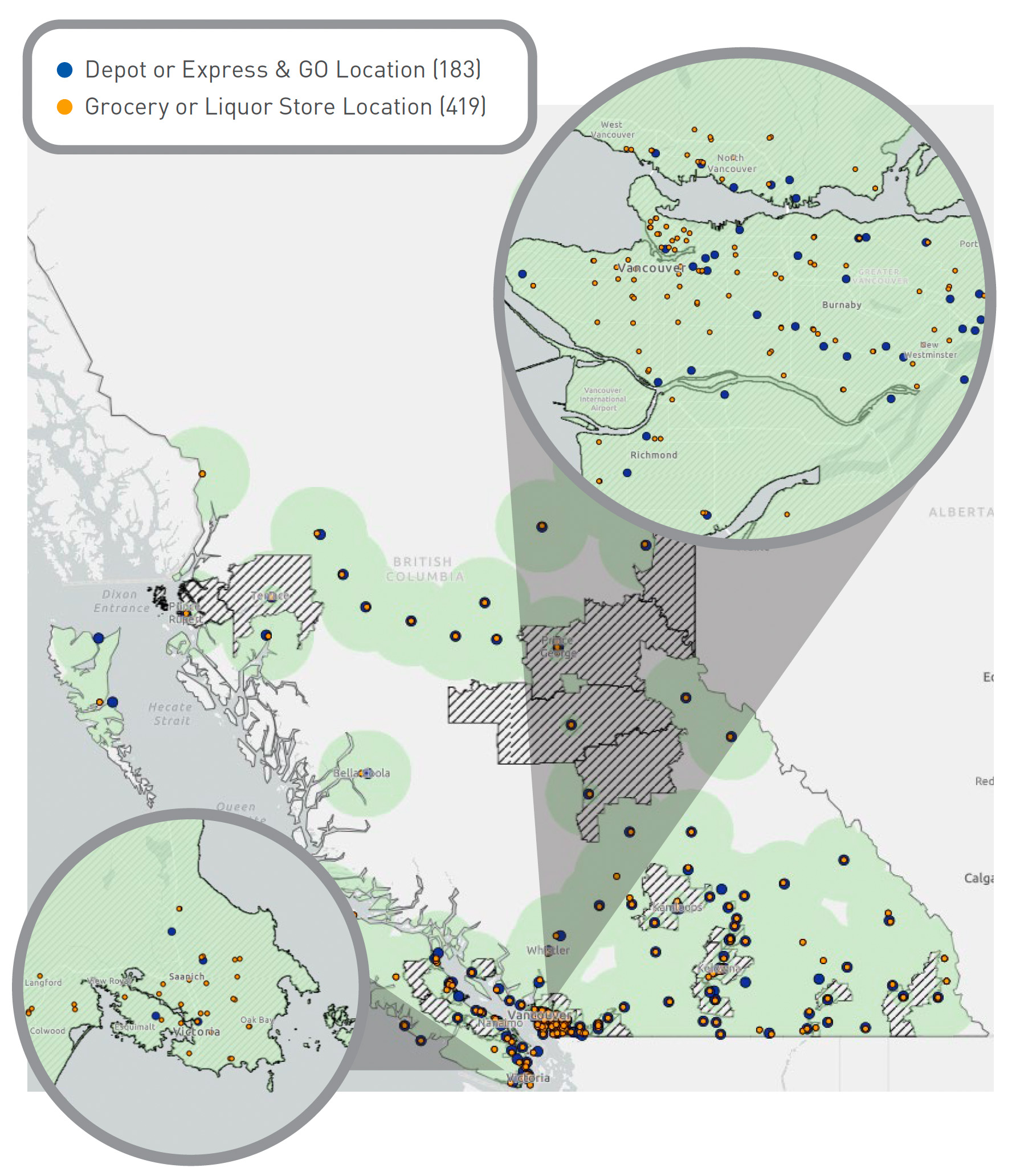04 Collection System and Facilities
4.1 Collection System and Facilities
In 2024, Encorp celebrated 30 years of environmental stewardship, marked by growth, innovation and resilience within its collection network. With a diverse array of collection points—including depots, retailers and Express— Encorp expanded access to convenient recycling options across BC. The Return-It Express program continued its strong growth, now representing approximately 15% of total collections, while strategic depot reopenings, relocations and investments in AI-driven efficiency underscored Encorp’s commitment to providing accessible and effective recycling solutions.
Overview
Since its inception, Encorp’s extensive collection network— including depots, retailers and other collection points—has successfully diverted over 26.1 billion beverage containers, reinforcing the organization’s commitment to sustainability.
The past year was one of growth and adaptation, with reopenings of previously closed depots, relocations to upgraded facilities and the addition of brand-new collection sites. Thankfully, unlike 2023, Encorp avoided major firerelated disruptions, and no severe weather events impacted deposit refunds or container collection operations. With stable conditions, Encorp’s logistics network functioned smoothly, ensuring uninterrupted collection, consolidation and recycling processes.
The Return-It Express program continues to expand, now accounting for 14.6% of total collection—an increase from 13.2% in 2023. By year-end, nearly 350,000 consumers were registered, and 12 new Express locations were added, making convenient, cashless recycling even more accessible across BC.
Highlights of 2024
Depot Reopenings: Resilience and Renewal
One of the most significant highlights of the year was the reopening of two Return-It depots that had previously closed due to tragic fires.
In Abbotsford, the former Moe’s Bottle Depot, which closed in late 2021, reopened under new branding as McMillan Return-It, bringing back a vital recycling service to the community.
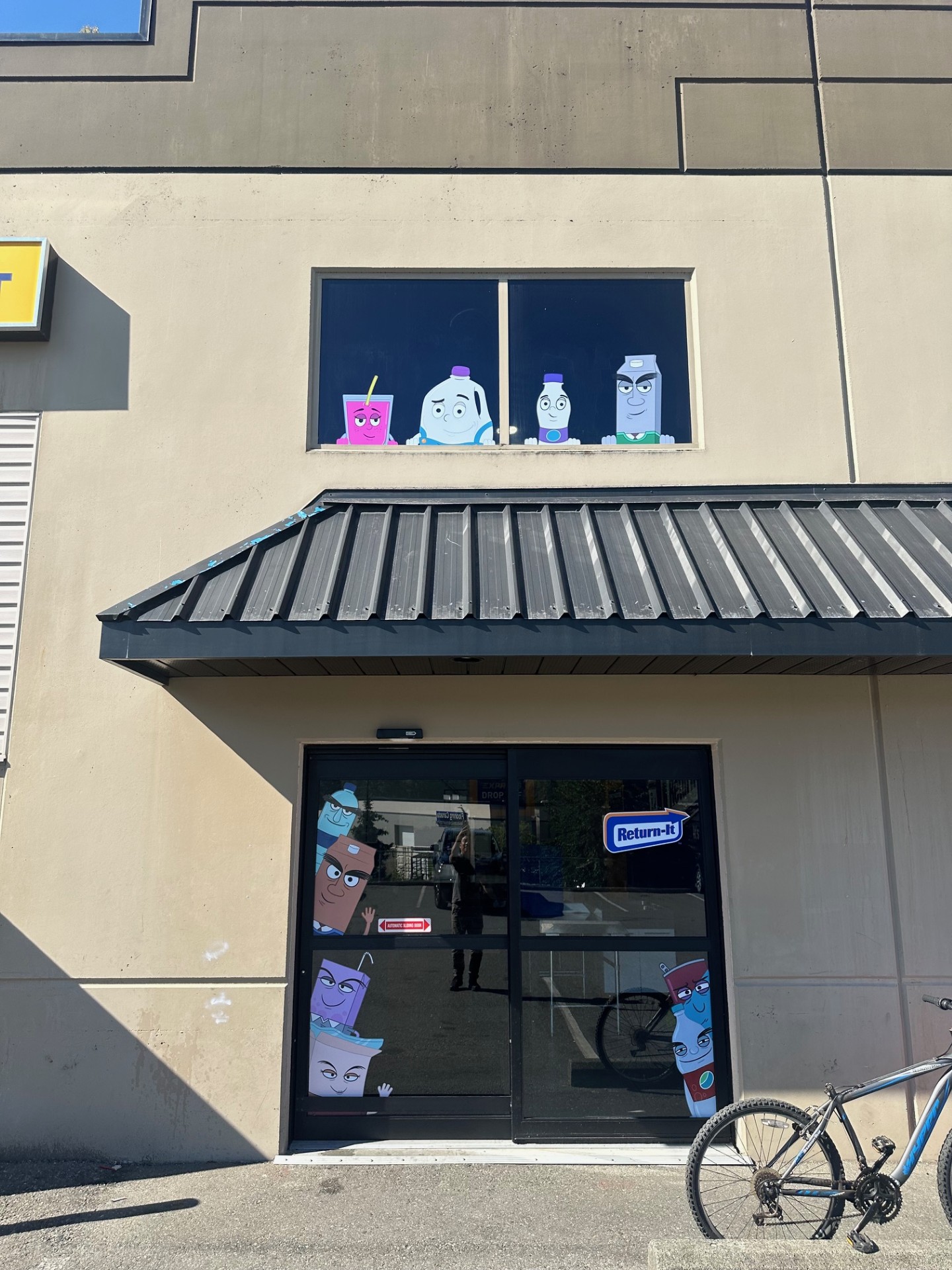
In Scotch Creek, after the devastating 2023 forest fires completely destroyed the original depot, a new owner stepped in to rebuild and relaunch the business, restoring recycling access to the area.
Encorp is looking forward to seeing both of these depots flourish in the years ahead, and continuing to serve their communities with renewed strength and commitment.
Depot Relocations: Investing in Long-Term Infrastructure
Several depots underwent significant relocations in 2024, enhancing accessibility and ensuring long-term service for their communities.
In Hope, the depot moved into a brand-new facility—a project made possible by inspiring community efforts, led by Mayor Victor Smith, who played a pivotal role in securing the new location. “We’re hoping to up our recycling. Do more here. And make a difference in the environment,” said Mayor Smith, who cut the ribbon and gave a quick speech during the reopening. During his speech, Smith said that “the District of Hope supported the relocation and the depot continuing to exist in Hope”. He also stressed that the depot was an important part of the community for many children, seniors and low-income families. The upgraded facility has been welcomed enthusiastically by local residents, who appreciate the improved convenience and service.
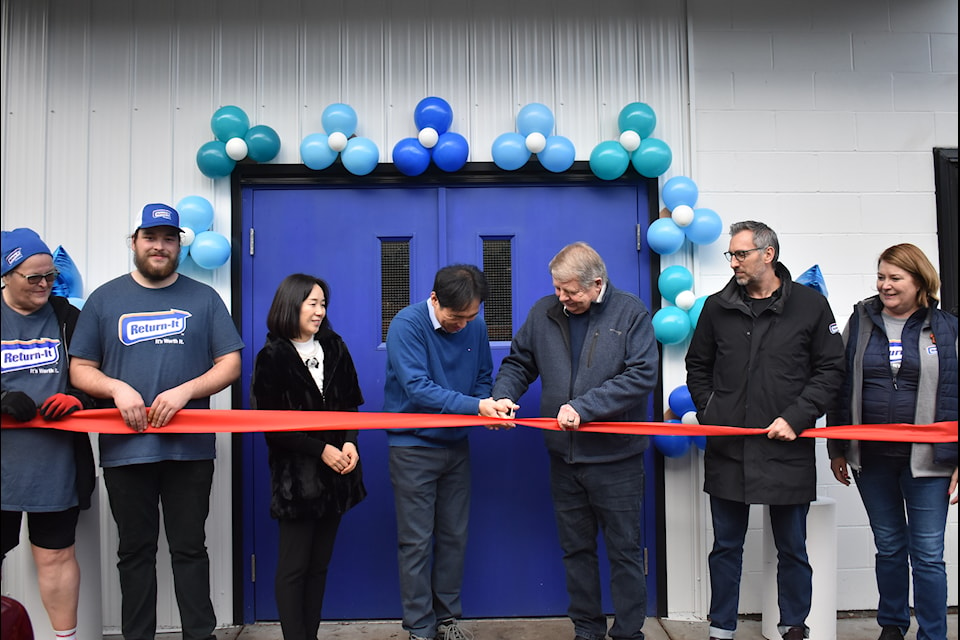
In Burnaby, the Edmonds depot relocated to a new site on Kingsway in September, ensuring continued service to residents of southeast Burnaby. This new location also introduced Return-It Express, providing an additional convenient cashless collection option.
Shifts in Collection Trends: A Changing Landscape
Although beverage sales increased by 1.2%, there was a slight decline in volume collected of 0.6% year over year.
- The traditional independent Return-It depot network, which remains the largest collection channel, saw a 0.7% decline in volume.
- However, Express volume within depots grew by 8.3%, while walk-in container volume declined by 2.3%.
- Depots offering Express maintained slight growth, whereas those depots without Express saw a total volume decline of more than 2%, reinforcing the growing popularity and consumer preference for the Express model.
Overview of Encorp’s Collection Network
Encorp utilizes multiple collection avenues to ensure the network meets the accessibility needs of BC consumers. This includes the independently contracted depot network, retail partners and corporate-run Express drop-off locations.
The collection network consists of 163 Return-It depots (an increase of one over 2023) operating under collection agreements with Encorp, and 20 Express locations across BC. Additionally, Encorp partners with retail collection points to further enhance accessibility.
For 30 years, Encorp’s collection network has made recycling convenient for people living in British Columbia. However, growing urban densification and redevelopment present challenges to the long-term sustainability of many depot locations. Recognizing this, Encorp actively monitors redevelopment trends in metropolitan and urban centres, where depot closures are becoming more common. Encorp continues to collaborate with local governments to advocate for recycling infrastructure in urban planning and to ensure that zoning allows for convenient collection sites near where people live. Maintaining and expanding accessibility is critical, as research consistently shows that convenience drives higher recycling rates. Looking ahead, the Express program will play an increasingly vital role in serving urban communities, and Encorp is committed to expanding Express-only sites in high-density areas to provide seamless and accessible recycling solutions.
In-Person Depot Regional Meetings
One of the greatest impacts of COVID-19 was to the way people communicated, forcing people to switch from in‑person to digital formats. Luckily, by 2024, with the major impacts of the pandemic largely behind us, Encorp was excited to arrange a series of in-person meetings with its depot partners from all around BC.
Between February and July 2024, Encorp hosted 10 regional meetings across BC to meet and discuss a variety of topics with depots. The meetings were an opportunity to reconnect in person and to provide all depots with an opportunity to have their voice heard, share their opinions and have a constructive two-way dialogue with Encorp.
In addition to having open discussion with depots, Encorp also prepared presentations on a variety of topics, with the hope of prompting discussion and brainstorming to solve some of the common challenges faced by the beverage container recycling program in BC. At the conclusion of the 10 regional meetings, a summary of key themes was prepared and shared with all depots. Encorp would like to thank the depot owners/operators who were able to participate for their time and thoughtful insights.
| 1. Recycling Trends: Global and Local | 5. Operating & Technology Trends |
| 2. Marketing | 6. Depot Optimization Opportunity |
| 3. Gap Analysis | 7. Depot Operating Standards |
| 4. Express Program | 8. Open Q&A |
Depot Efficiency Efforts
In 2024, Encorp continued to work with depot partners to implement the simplified sort procedure to increase depot efficiency and reduce wait times for consumers. Encorp also embarked on a research and development project aimed at utilizing Computer Vision and Artificial Intelligence to categorize and count containers. Lastly, Encorp also launched a pilot project aimed at helping depots identify opportunities to enhance their operations and drive improvements.
Simplified Sort Procedure
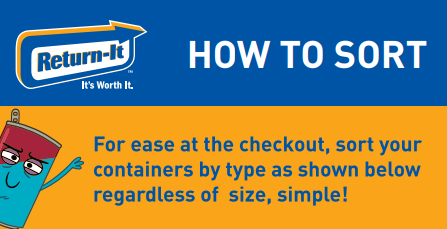
The simplified sort procedure, first introduced in late 2021, has continued to expand across the Return-It network, eliminating the need for consumers to sort their used beverage containers by size and content. By the end of 2024, 96% of depots had adopted the new system, with only seven locations still operating under the previous method. While falling slightly short of the target for full implementation in 2024, Encorp made significant progress, adding 23 more depots to the program. Encorp remains committed to achieving full adoption in 2025. The simplified sort process has been widely embraced, both by depot operators and consumers. Depots benefit from a more efficient use of customer areas, while consumers save time, needing to sort containers into only eight categories instead of the previous 28. As a result, customers are served more quickly, reducing wait times and improving the overall depot experience.
Artificial Intelligence R&D Project
Encorp has been closely monitoring the widespread use and growth in artificial intelligence and analyzing how it can be applied to collection operations to increase efficiency. In 2024, Encorp launched a research and development project with a goal of utilizing camera-based computer vision technology and AI to accurately and quickly categorize and count containers to calculate deposits for walk-in customers and Express bag processing. The project is taking place internally at Encorp’s count centre facility in New Westminster, with a goal of increasing the counting speeds by a factor of 10 to service customers faster and more efficiently. By separating the counting and sorting activities using this technology, the material can then be sorted using more traditional sorting equipment, which is widely used in the waste management industry, once customer deposits have been calculated.
Depot Optimization Pilot Project
In 2024, Encorp launched a new pilot program aimed at helping depots identify opportunities to enhance their operations and drive improvements. The ultimate goal of the pilot was to help depot partners achieve greater efficiency when collecting used beverage containers. The pilot program involved Encorp arranging for an industrial engineer from a leading BC-based firm specializing in operational efficiency improvement to visit a depot for a day and observe their operations. Based on the observations and discussions with the depot owner, an Operations Efficiencies Opportunities Report was prepared and provided to the operator with a series of potential action items aimed at optimizing business operations. The pilot was fully funded by Encorp and had 23 depots participate from around the province. Feedback from participating depots was overwhelmingly positive and will be evaluated for continuation in 2025.
Efficient & Sustainable Logistics: Powering BC’s Recycling Network
For three decades, Encorp’s logistics network has been the backbone of efficient recycling in BC, built on longstanding partnerships with dedicated transportation providers. These partners collect materials from depots, retailers and other collection sites, and transport them to consolidation facilities where they are sorted and prepared for end recyclers.
Encorp’s logistics system is supported by 43 transport partners, who deliver materials to 15 consolidation sites across the province. In urban centres, Encorp relies on dedicated transporters to facilitate timely collection; in rural and remote areas, the network leverages backhauling solutions, maximizing efficiency and reducing environmental and financial costs.
A key innovation in the logistics operations is Encorp’s mobile compaction program, which features Canada’s first-of-its-kind hybrid CNG-electric compaction trucks. These specialized vehicles service multiple depots on five key routes, collecting PET, HDPE, gable top cartons and drink box containers from 28 of the province’s busiest depots. As Encorp continues to refine and expand its logistics network, the focus remains on innovation, efficiency and sustainability—ensuring BC’s recycling system remains robust, accessible and environmentally responsible.
Express
Return-It Express
Signing-up for Express requires going through the easy registration process on the Express website at express.return-it.ca. Customers collect their used beverage containers in transparent bags and take them to the Return-It Express drop-off location of their choice. Customers print labels with their account information and place them on their bags.
The empty containers are then sorted and counted at a depot or count centre so the deposit refund can be credited to the customer’s Express account. Customers can redeem their deposit balance via Interac e-transfer—the preferred choice for more than 97% of customer redemptions. Alternatively, customers with larger withdrawals or business accounts will request a cheque to redeem deposits from their Express accounts.
The popular Return-It Express program continued to grow in 2024, with more than 48,000 customers signed up for the program, reaching just shy of 350,000 registered customers at the end of 2024. This is a 16.3% increase from 2023.
Encorp’s marketing efforts to promote the Express program, combined with word-of-mouth popularity, continue to drive registrations averaging 900 new customers per week.
Express continues to grow in volume collected year over year as more consumers participate because of the convenience of the system. In 2024, 19 million more containers were collected through Express compared to 2023, a 9.5% increase.
The Express system accounts for approximately 15% of all the volume collected through depots in the network and accounts for 23% of volume when only considering those depots that offer the Express system.
The Return-It Express program provides consumers with a convenient drop-and-go means of recycling their used beverage containers without the need to pre-sort them for a refund at a depot. In 2024, Return-It Express was offered at 113 locations across BC, including 12 new locations. Ten of these were new in-depot Express locations and two were new Express & GO locations: one in Steveston and another in Lumby.
The Express system continues to be a popular fundraising solution for charitable organizations, sports teams and school groups. Fundraising organizations provide relevant account information to potential donors, who can print off the organization’s labels and drop off their containers. The deposits are then added to the account of the organization(s) they choose to support.
Expanding Accessibility with Return-It Express & GO
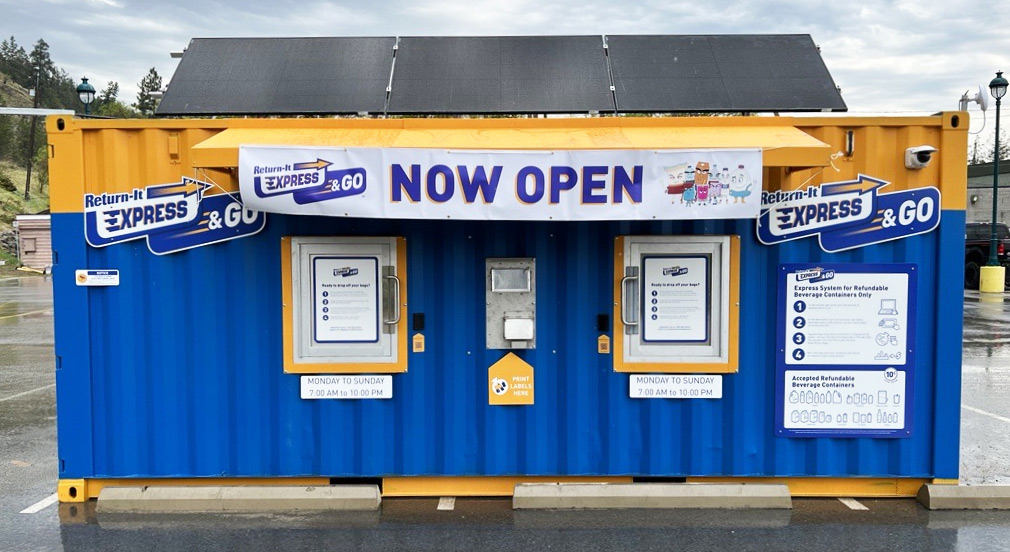
Encorp’s Express & GO stations have become an essential solution for serving consumers in underserved rural communities and high-density urban areas where traditional depots are challenging to establish, due to rising real estate costs and zoning restrictions. By offering a flexible, accessible drop-off option, Express & GO helps bridge the accessibility gap, giving BC residents more ways to return their used beverage containers. In 2024, Express & GO volume grew by 26% over 2023, reflecting the increasing demand for convenient alternative recycling solutions.
| 2019 | Tofino, Simon Fraser University |
| 2020 | North Vancouver Transfer Station, Big White, Park Royal Mall (West Vancouver) |
| 2021 | North Vancouver Superstore, McBride, UBC Campus, Hartland Transfer Station (Victoria) |
| 2022 | Coquitlam Waste Centre, Penticton, Keremeos |
| 2023 | Comox Your Independent Grocer, Kelowna Glenmore Landfill, Peachland Royal Canadian Legion, Quesnel Extra Foods |
| 2024 | Steveston, Lumby |
The Steveston Express & GO station marks a milestone as Richmond’s first Express & GO location. The City of Richmond has been a leader in embracing modern, flexible recycling solutions, prioritizing practical approaches over regulatory mandates. This forwardthinking approach facilitated the swift introduction of the new Express & GO station in Steveston, reinforcing Richmond’s commitment to sustainability.
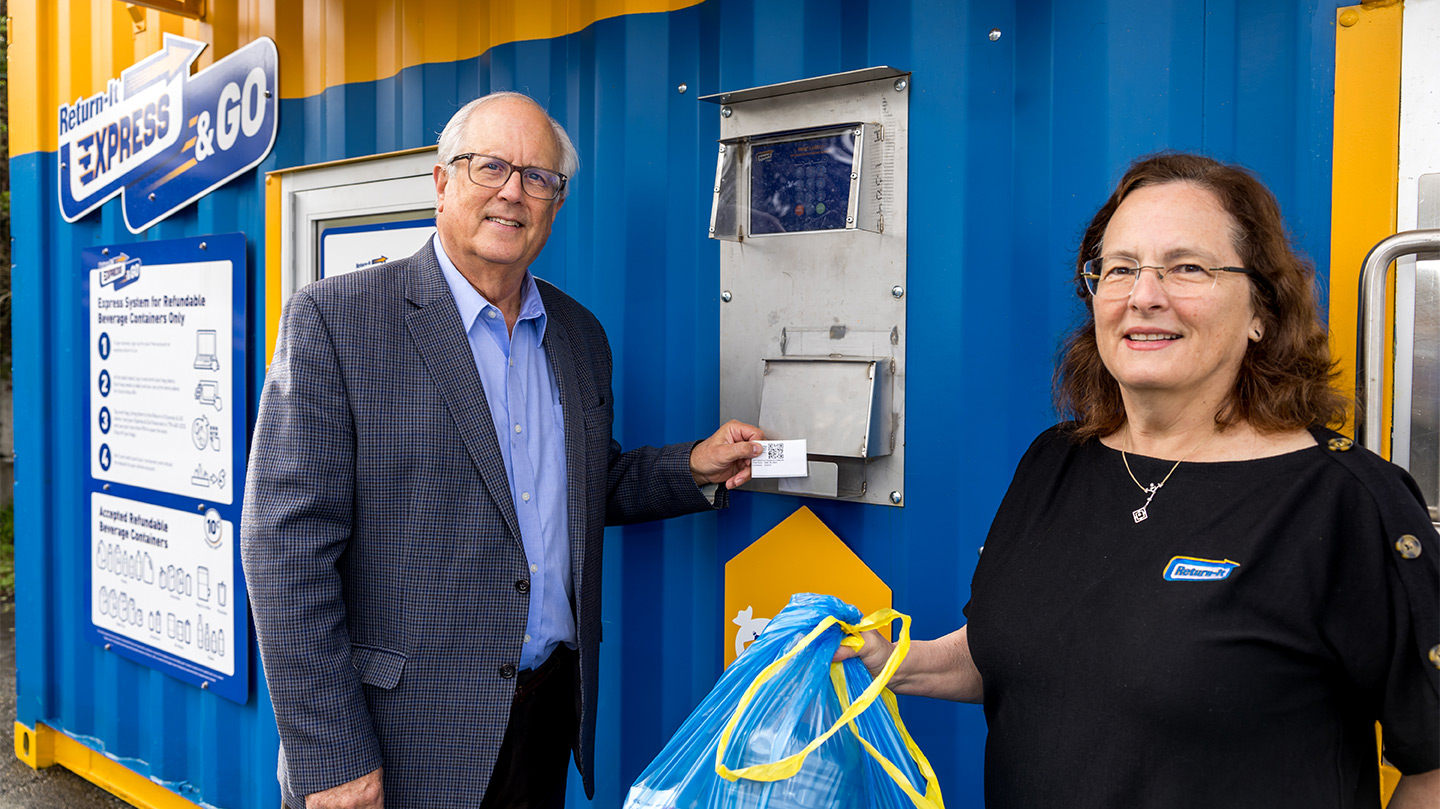
Richmond Mayor Malcolm Brodie welcomed the initiative, stating: “Richmond is proud to support sustainable practices and make recycling easier for our residents. The new Express & GO station is a great addition to our city’s recycling infrastructure, and we commend Return-It for their partnership approach.”
Recycle BC Curbside Collection: A Collaborative Approach to Recovery
In 2024, deposit-bearing used beverage containers collected through Recycle BC’s curbside program accounted for 7.6% of Encorp’s total recovery rate, highlighting the significant role of this collection channel in BC’s recycling system.
Collaboration between stewardship agencies is a key component of BC’s extended producer responsibility framework. Encorp has a long-standing partnership with Recycle BC, ensuring that deposit-bearing beverage containers collected through curbside blue box programs are accurately counted in Encorp’s overall recovery rate. Many BC residents choose to place used beverage containers in their curbside blue boxes alongside other household recyclables due to convenience; this partnership helps ensure those containers are properly tracked and recycled.
To quantify the impact of this channel, Encorp and Recycle BC employ a rigorous, well-established sampling program to determine the number of used beverage containers collected through curbside recycling. Encorp then integrates these results into its recovery rate calculations, ensuring a comprehensive and accurate measure of the total volume of deposit-bearing containers recovered across all collection avenues.
IC&I Sector: Enhancing Visibility in Commercial Collection
To ensure all deposit-bearing beverage containers collected for recycling are accurately accounted for, Encorp has strengthened its collaboration with commercial waste management companies operating in the Industrial, Commercial & Institutional (IC&I) sector. These companies collect mixed recyclables from multi-family buildings, commercial properties, educational institutions and industrial sites, transporting them to material recycling facilities (MRFs) for processing.
Previously, beverage containers collected through this stream were not tracked in Encorp’s recovery rate, despite being diverted for recycling. By expanding partnerships with waste management providers, Encorp has gained greater visibility into this collection channel, ensuring these containers are properly recognized in overall recovery reporting through a rigorous sampling process.
As a result of these efforts, the IC&I sector accounted for nearly 3% of Encorp’s total recovery rate in 2024, further reinforcing the importance of collaboration in capturing all recycled materials across BC’s recycling network.
Retail Collection: A Continued Commitment to Accessibility
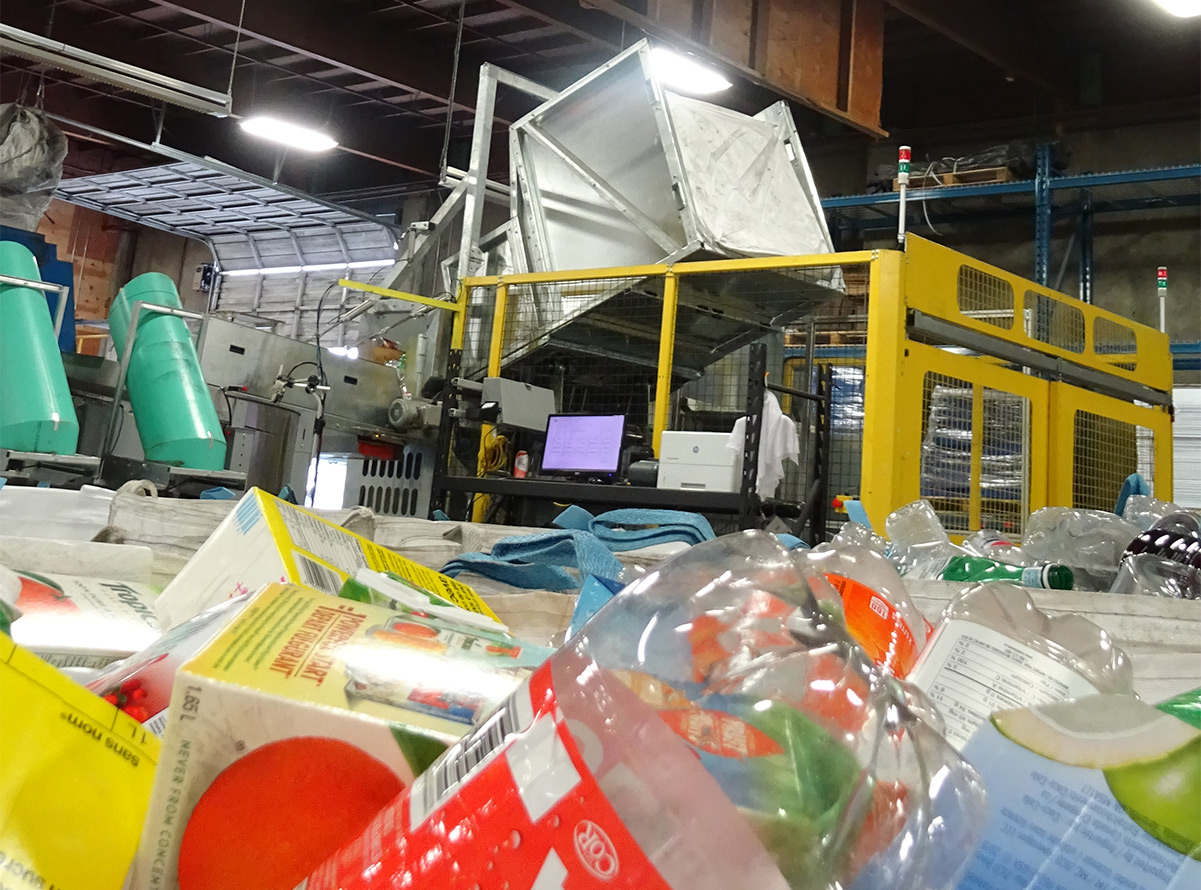
For 30 years, Encorp has worked to ensure BC residents have convenient and accessible recycling options. While Return-It depots remain the backbone of the collection network, grocery stores and government liquor stores also play a key role in providing additional collection points, particularly in areas with limited access to depots.
Under BC’s Recycling Regulation, retailers that sell beverages—such as grocery stores and liquor stores—are required to accept up to 24 beverage containers per person, per day, provided they are the same types of containers sold in-store. This return-to-retail model offers consumers a convenient way to recycle their beverage containers during routine shopping trips, ensuring even more containers are diverted from landfills and properly recycled.
In 2024, retail collection sites accounted for 1.6% of total recovery, with Encorp collecting:
- 7.5 million containers from 197 government liquor stores.
- 15.2 million containers from 222 grocery stores across the province.
Quality Control and Count Centre: Ensuring Accuracy & Efficiency
Encorp operates a multi-purpose Quality Control and Count Centre in New Westminster, serving as a critical hub for maintaining accuracy, efficiency and compliance within the collection network. This facility plays a key role in daily operations, supporting quality assurance audits, Express bag processing, and sample auditing for various collection, and serves as a research and development hub.
4.2 How the Collection System Works
Encorp’s collection system is composed of a variety of convenient options for consumers to return their used beverage containers for a deposit refund and to ensure they are recycled.
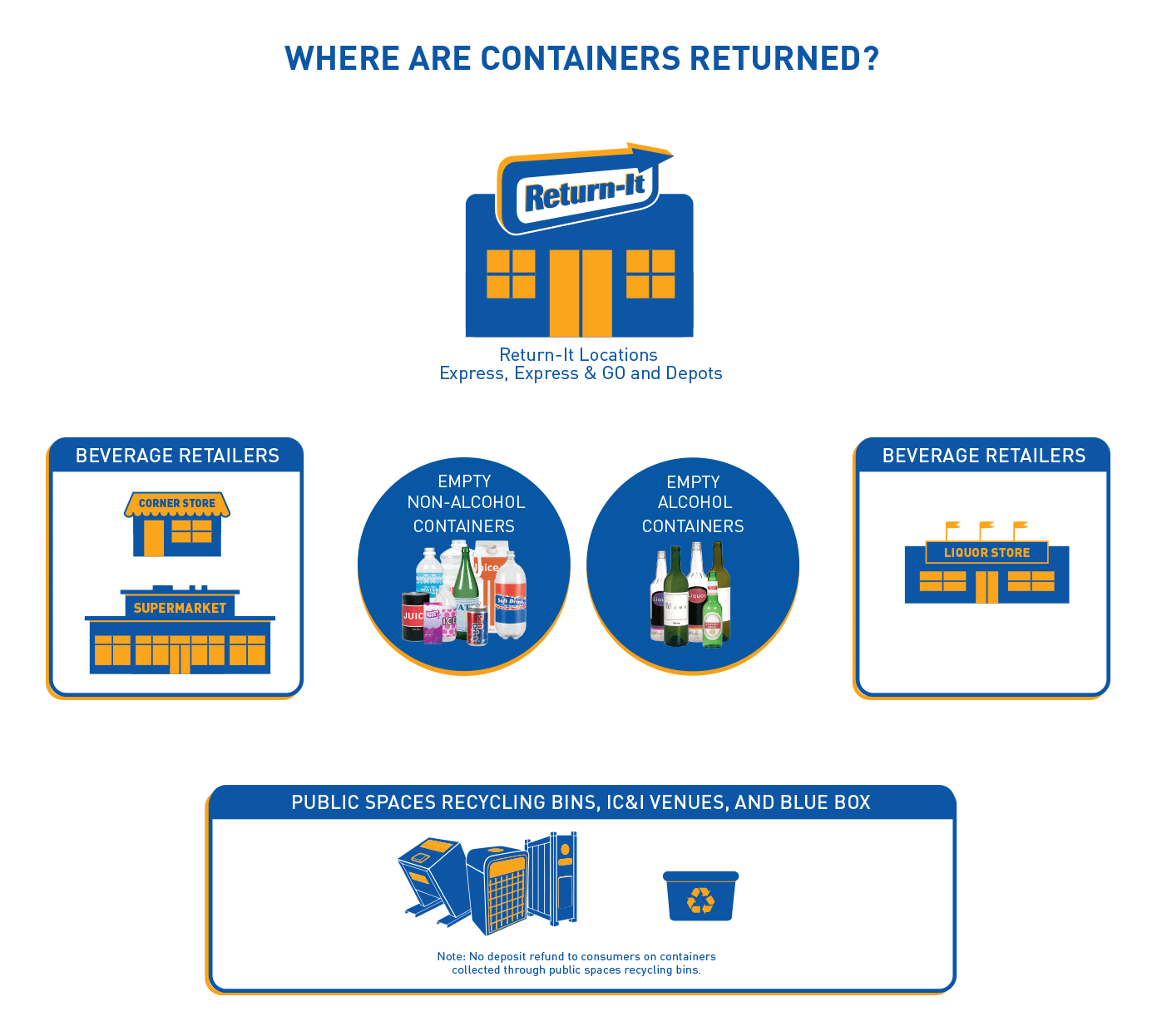
4.3 Collection, Transportation and Processing Map
For 30 years, Encorp’s recycled material network has thrived through strong partnerships with contracted collection, transportation and consolidation providers. Some of Encorp’s transportation partners have been with the company since the very beginning, demonstrating their long-standing commitment to supporting BC’s recycling infrastructure.
Encorp’s transportation network operates through a combination of long-term partnerships and periodic selections through a request for proposal (RFP) process, ensuring a reliable and efficient logistics system. Transporters collect used beverage containers from Return-It depots and other collection points and deliver them to the nearest approved consolidator. Once at the consolidation facility, the material is compacted and prepared for shipment to various end-market recyclers, where it is processed; material that is recovered can be used to create new products.
This well-established and continuously optimized network ensures that beverage containers collected across BC are efficiently transported, processed and reintegrated into the circular economy—a testament to the strength of Encorp’s partnerships over three decades of operations.
 Express Plus
Express Plus
 Express & GO
Express & GO
 Return-It Depot
Return-It Depot
 Processing Plant
Processing Plant
 Consolidation Site
Consolidation Site
Note: Map outlines collection, transportation and processing for all commodities except glass.
For detailed location search, please visit return-it.ca/locations.
4.4 GIS Mapping and Accessibility Analysis
Since commencing operations in 1994, Encorp has established a comprehensive network of permanent collection locations where the public can conveniently return beverage containers covered within Encorp’s plan.
Encorp has engaged a third-party consultant, Licker Geospatial, to conduct a complete benchmark geographic information system (GIS) mapping analysis to ensure reasonable access as outlined in the Recycling Regulation. The criterion started with the premise of serving more than 97% of the province’s population. Encorp exceeds the 97% accessibility target.
Encorp has adopted a minimum criterion for rural coverage, requiring a catchment population of 3,000 within a 45-minute driving radius. This criterion is notably higher than the industry standard, which typically requires a population of over 4,000. In urban areas (defined as census metropolitan areas by Statistics Canada), the program has set a 30-minute driving radius as its standard. However, most Encorp locations are within a 15-minute driving radius, with the exception of the City of Vancouver, where siting new locations has been particularly challenging. Licker Geospatial has completed accessibility analyses for all Return-It facility locations using the 2021 population at the dissemination block level and three different accessibility standards:
1. 4,000 Population Threshold
Defines urban accessibility as a facility within a 30-minute driving radius. For rural coverage (outside a census metropolitan area), assessed for communities where the census subdivision’s total population was equal to or exceeded 4,000, access is defined as passing the standard if it is within a 45-minute driving radius.
2. 3,000 Population Threshold
Identical to the 4,000 Population Threshold, with the exception of rural coverage (outside a census metropolitan area) being assessed for communities where the census subdivision’s total population was equal to or exceeded 3,000.
3. Revised Standard
Defines urban accessibility as a facility within a 15-kilometre radius. Rural accessibility is defined as within 60 kilometres when the community is within 200 kilometres of a census metropolitan area (CMA).
Using specialized Esri ArcGIS Pro processes, drive times and planar distances were calculated from each dissemination block’s centroid to the nearest facility in order to assess whether the resident population had sufficient access under the three standards. Access to 2024 facilities was assessed on the respective years’ road network, although only 2021 population numbers were used, as census data is only available in five-year intervals and 2021 was thus the most accurate data available. The graphic below shows the percentage of the population found to have access to a Return-It facility under the previously described standards in 2024 provincially.
Given the goal of 97% of the province’s population (within the standard’s evaluation parameters of rural coverage) having access to a Return-It facility, all three standards meet this target.
